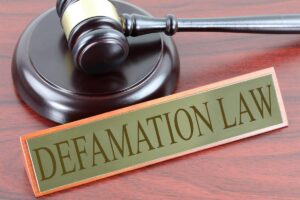![]()
Who cannot sue for Defamation and elements needed to be proven by Reza L.

We continue with our topic of defamation where will outline some brief key points essential for our readers to grasp the essentials of the word defamation in British Law.
There are three types of groups that one cannot sue for defamation. Firstly, in British law, any companies that have not suffered “serious harm’ under Section 1, Subsections 1 and 2 of the Defamation Act 2013 cannot sue.
Defamation Act 2013
1Serious harm
(1)A statement is not defamatory unless its publication has caused or is likely to cause serious harm to the reputation of the claimant.
(2)For the purposes of this section, harm to the reputation of a body that trades for profit is not “serious harm” unless it has caused or is likely to cause the body serious financial loss.
Secondly, corporations affiliated with the government or state bodies have no capacity to sue for libel for damages to their reputation. The case of Derbyshire County Council v. Times Newspapers Ltd. (1993) overruled the prior authority of Bognor Regis Urban DC v. Campion (1972), which held that any corporation working with local governments or state bodies is entitled to sue for damages against reputation.
The judgment held today is that of Derbyshire. In this case, The Times Newspapers Ltd. published an article questioning the integrity of the Derbyshire County Council and its ability to mismanage funds of the public. The Council sued in libel and appealed upon dismissal at the Court of Appeal.
It was held in the House of Lords that the organs of government should not have a common law action in libel, as this would be contrary to the purpose of the action and damaging to free speech. The appeal was dismissed while Lord Keith commented the case and described the notion of the possibilities of the threat of civil actions for libel by state bodies against newspapers agency as ‘chilling’
Thirdly, political parties cannot sue for defamation, as held in Goldsmith v. Bhoyrul (1998). In this case, the claimants were members of a political party, while the defendants published an article claiming the politicians lied to their electorate. The claimant sued for defamation. The High Court held the case in favor of the defendant, taking reference to the case of Derbyshire being the basis for the protection of free speech against public bodies. The judges held that extension of this definition to political parties would be essential to maintaining freedom of expression. Lord Buckley J. explained the case of Goldsmith in terms of free and democratic principles that those in power or those who are held in public offices to administer the state must always be open to criticism.
It is important the reader to consider the notion that to prove defamation a claimant must prove four main arguments.
- statement complained of was defamatory;
- statement referred to the claimant;
- Statement was published;
- Serious harm to the claimant’s reputation; (s.1 of the 2013 Act)
To be continued.
Reza L.



